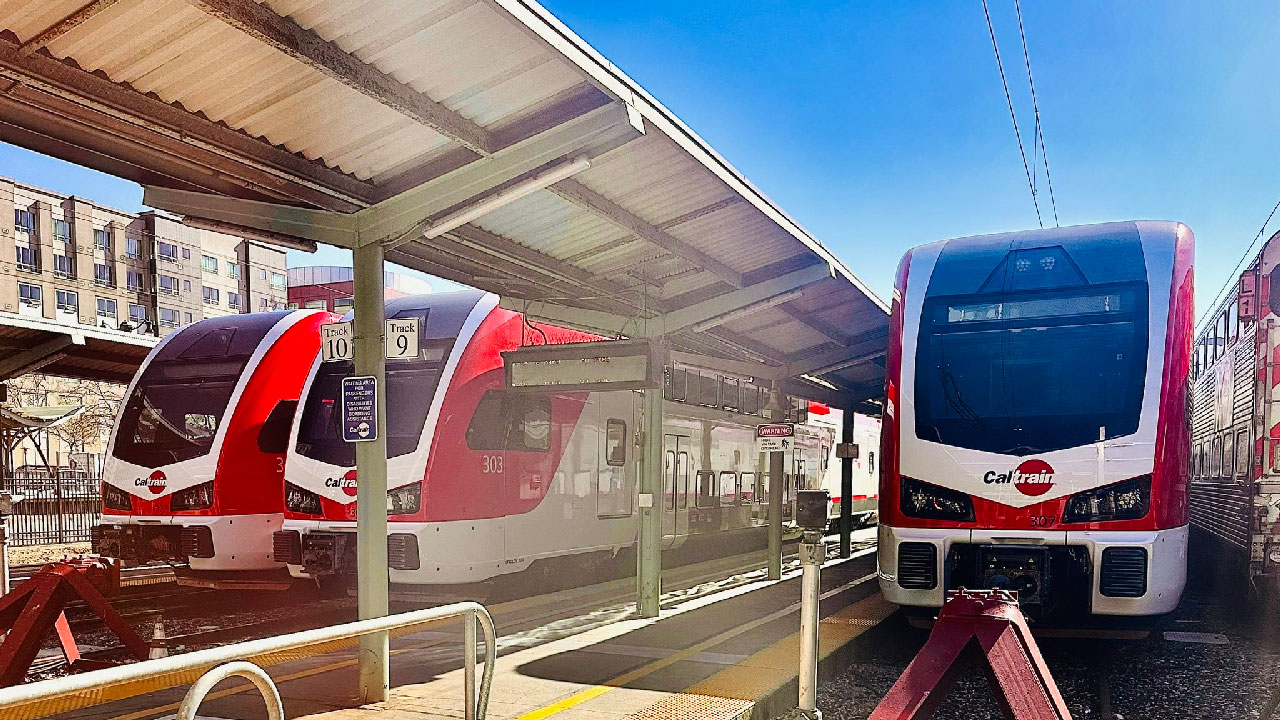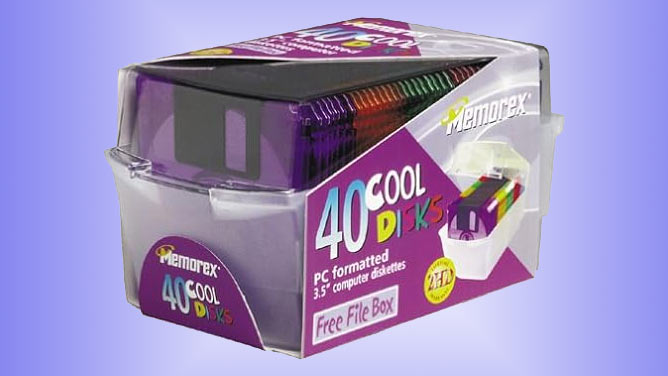Floppy disk-reliant San Francisco train control system spurs concerns of 'catastrophic failure' — and it won't be replaced for at least another decade
We hope the SFMTA exec wasn't talking about a human catastrophe.

The San Francisco Municipal Transportation Agency’s (SFMTA's) train control center has been reliant on a floppy disk-based computer system since 1998, according to an ABC7 News report. As well as this being something of a surprise for Silicon Valley residents, it is alarming to hear the SFMTA director worries that there won’t be an upgrade before a “catastrophic failure” occurs.
Silicon Valley is renowned worldwide for its development and embrace of cutting-edge technology, with some of the most iconic and important pioneers of computing having their headquarters here. However, while local labs, office complexes, and factories leverage the latest technologies - and local cafes and eateries brim with folk discussing AI, semiconductors, and robotics – some key public transport infrastructure is relatively ancient.
In the ABC7 report, we hear an SFMTA exec explain that the 1998 system that is essential to smooth running rail services was introduced “in an era when computers didn’t have hard drives.” That assertion is perhaps a decade adrift, as HDDs were commonplace even in home computers from the early 1990s. Then of course Windows 95 arrived, with the initial release requiring 24 floppies for installation. The late 90s were more like the heyday of the CD-ROM era.
There seemed to be more confusion regarding what kinds of floppies the SFMTA system relied upon. The roving TV reporter brandished a 3.5-inch floppy disk several times in the video segment about the aging train control system. However, she said that the systems required three 5-inch floppies to be updated every day. Perhaps it was a misread of 3.5-inch floppies as we think 5.25-inch floppies were more of a 1980s standard medium.

Moving back on topic, SFMTA director Jeffrey Tumlin explained that the current system for train management has been in place for 26 years, exceeding its planned 20-25 years of operation before becoming obsolete.
Currently, everything still works fine, asserted Tumlin, but “with each increasing year risk of data degradation on the floppy disks increases and that at some point there will be a catastrophic failure,” he worried. We hope that the potential catastrophe highlighted will only involve the computer system, not the trains or carriages full of people.
The SFMTA director told ABC7 news that any new system will take about a decade and hundreds of millions of dollars to implement. There is no contractor yet, so the decade-long development cycle has yet to begin, but officials are aiming for an all-encompassing system for trains and subways in San Francisco and surrounding areas.
Get Tom's Hardware's best news and in-depth reviews, straight to your inbox.

Mark Tyson is a news editor at Tom's Hardware. He enjoys covering the full breadth of PC tech; from business and semiconductor design to products approaching the edge of reason.
-
jahcriado I know the author pointed out that by 1998 the Norm for most systems was CD, but you must remember all things public and government related typically run a decade behind technologically. Sometimes even further. There is a good chance that whoever the contractor was who designed and installed that system either could only do that type of system, or was under contract to provide that type of system. In 1998, a floppy based system was still pretty relevant, and was tested and known to be resilient. Same thing if you look at technology used by NASA in a lot of their missions. It's usually a few generations older, and has been hardened against issues they know they'll face. What is sad is that the hardware they apparently installed in 1998 has no way of using other hardware for data storage and updates. That is poor foresight.Reply -
USAFRet Reply
If you were to build a system today, would it be capable of being seamlessly upgraded to whatever hardware is in use in 2050?jahcriado said:What is sad is that the hardware they apparently installed in 1998 has no way of using other hardware for data storage and updates. That is poor foresight. -
Priscus ReplyAdmin said:The San Francisco Municipal Transportation Agency’s train control system has been reliant on a floppy disk-based computer system since 1998. It won't be replaced for at least another decade.
Floppy disk-reliant San Francisco train control system spurs concerns of 'catastrophic failure' — and it won't be replaced for at least another decade : Read more
Haha, old tech eh? You never know where it is going to crop up.
When I moved to London in 1960's, I was amazed to learn that train control on London underground was implemented using 'Pianola Rolls'! I cannot find coverage of this online, but there is a readable account in print: article in 'Meccano Magazine' circa 1959.
I have to admit, I still keep a pair of floppy drives (5.25 &3.5), on the end of a very long power and data cable. When the need to flash a BIOS on an old machine arises, they often were meant to be updated from floppy, so it is the easiest way to do this. OK, I know there are other ways, but anything for making life easier.
The 5.25 drive, I rediscovered where it had laid amongst some of my junk for about 40 years, The huge flywheel was covered in rust. I thought it would never again work. But I also found some 5.25 disks, and was curious to know what as on them: turned out it was an application called 'Harvard Graphics'. That device, unused for decades, thrown into junk........
Powered up and ran fault free! -
DavidMV You can probably fix this without touching the main system or its code. Use a floppy emulator that takes a USB flash drive, something like what retro gamers use. I'm sure something more robust and well tested could be made within a modest budget. Obviously security issues will have to be investigated too. But, it isn't as hard as they make it sound.Reply -
Priscus ReplyDavidMV said:You can probably fix this without touching the main system or its code. Use a floppy emulator that takes a USB flash drive, something like what retro gamers use. I'm sure something more robust and well tested could be made within a modest budget. Obviously security issues will have to be investigated too. But, it isn't as hard as they make it sound.
Yes. Floppies not the best for retaining data integrity are they.
About fifteen years ago, when floppies were on their way out, I purchased a load of MIDI music files at a clearance (ie for peanuts) on floppies from my local music shop. About a fifth of these have degraded to now be not usable. Fortunately I had copied their content, so media deterioration did not matter. -
newtechldtech Reply
yes .. using PCIe lanes for storage.USAFRet said:If you were to build a system today, would it be capable of being seamlessly upgraded to whatever hardware is in use in 2050? -
USAFRet Reply
Think back 25 years ago.newtechldtech said:yes .. using PCIe lanes for storage.
Was PCIe a thing? No, it was not.
Will it be a thing in 2050? Probably not. -
newtechldtech Reply
it will be some Gen 10 in 2050 .. the data per lane will not it the wall in 2050 ... it will take longer.USAFRet said:Think back 25 years ago.
Was PCIe a thing? No, it was not.
Will it be a thing in 2050? Probably not.
by the way , back in 1998 we had usb already and today still working. -
USAFRet Reply
Yes, we had USB.newtechldtech said:it will be some Gen 10 in 2050 .. the data per lane will not it the wall in 2050 ... it will take longer.
by the way , back in 1998 we had usb already and today still working.
1.0.
And disturbingly slow connecting a 1.0 device to a current system.
But, whatever.
Protocols and interfaces change.
Sometimes, they go away completely. Or are so slow as to be laughable.